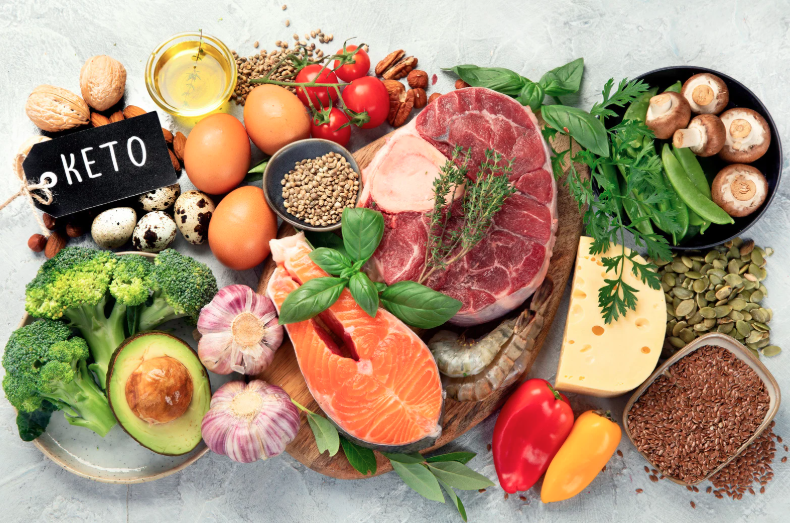If your New Year’s resolution includes losing weight, you may be looking for the best diet to achieve your goals. You may have heard of the Keto diet, Paleo, Low Carb or even Carnivore. You may have friends that swear by one or the other, or maybe you have tried Keto and lost some pounds but found it too hard to sustain in the long run. Note: I realize I’m leaving out vegetarian and vegan diets, more on those to follow.
What is the Keto Diet?
First let’s clear up a few myths about the keto diet. The word Keto designates different diets which is where the confusion starts. The classic Keto diet promoted by certain weight loss centers is high protein, low carb and low fat. You are given a lot of processed protein bars, shakes and meals, some high in GMO soy. Then you are given sticks to measure ketones in your urine, and vitamin and mineral supplements since your diet is fairly artificial.
If you follow these weight loss programs you will most certainly lose weight. You may also feel hungry and fatigued, and develop digestive issues from all the processed soy. And everyone I know who has tried this has put the weight right back on afterwards. It’s not a sustainable diet. Plus all this protein can end up damaging your kidneys. Excess protein is converted to sugar by the body so this type of keto diet can worsen diabetes. High intake of lean protein also depletes vitamin A which leads to lower testosterone and can cause infertility over time.
Hence, this strict version of keto is the toughest to stick to, is not in balance, and can have negative health effects.
Modified Keto Diets
The good news is, you do not have to be in ketosis to lose weight. No annoying urine test strips or “keto flu” symptoms.
On a “modified” Keto Diet, your protein intake is much more moderate, though you still want to have protein in every meal. Carbs are still low but you can allow yourself more healthy fats.
This will keep your blood sugar much more stable, you will stay full much longer and cravings disappear. You should also have much more energy than on the strict (high protein) keto diet or on the Standard American Diet.
So how much protein should I eat? This depends on gender, muscle mass, activity level and age, but a good rule of thumb is: have a protein with every meal and snack, have as much or more protein than carbs (not counting vegetables), and top it all of with a generous amount of healthy fats. Healthy fats in every meal are important to keep your blood sugar stable and keep you in a fat-burning metabolism. Cook with unrefined olive oil or grass-fed butter, have nuts and seeds as a snack or on salads, add avocado or use unprocessed coconut oil and palm oil.
A very high fat version of the Keto diet is successfully used to control Epilepsy symptoms which tend to worsen with sugar and starch.
Proteins Sources on the Keto Diet
The high protein keto diet can really only be achieved with shakes and bars, since nobody can eat that much chicken breast. I always prefer real foods over fake, especially for proteins since the processed protein isolates are very hard to digest. Your natural protein choices include meats, ideally 100% grass-fed, poultry, wild fish, eggs, dairy and legumes. Except for dairy and legumes, these do not contain carbs. As to legumes, keep in mind that, while they do offer good protein, they generally contain more carbs than protein, so they are not the best protein choice for the Keto diet. You can have a small portion of legumes on the keto diet, but you will need another carb-free protein source to accompany them. They are high in fiber, which makes them “slow carbs”, and can really help keep you full and satisfied. I would not recommend soy more than once or twice a week since it blocks certain thyroid enzymes. Most soy is also GMO and laden with pesticides, so the best choice is organic tempeh. Tofu is high in aluminum and phytates and best avoided.
What about Cheese on the Keto Diet?
Some clients I have worked with were on a cheese Keto diet with a lot of their protein coming from cheese, plain cottage cheese or plain Greek yogurt. And yes, those are high in protein and low in carbs, and will not spike your blood sugar. However, a lot of dairy can be hard to digest, especially if pasteurized and processed, and tends to be constipating. Commercial dairy is also high in estrogen which blocks weight loss. Most people tend to see their weight loss speed up when they avoid dairy.
So it may be a good idea to avoid or limit processed dairy for a while, especially if you have any digestive issues or constipation. Once you have reached your goals, you can reintroduce grass-fed unprocessed dairy.
How many Carbs Should I Eat?
I get this question a lot. The answer always depends on the person, activity level, and their goals. Undoubtedly, the lower you go the faster you will lose weight. Unless of course there are obstacles to weight loss like thyroid issues, toxic load, nutrient deficiencies etc. But for most people weight loss is highly correlated with carb (as in sugar and starch) intake.
To stay in ketosis on the classic keto diet you will need to limit your net carbs, which are total carbs minus fiber – to less than 50g per day, though most are around 30g. Considering that the average on the Standard American Diet is about 300g of mostly refined carbs – starches and sugars – making such a drastic change might be hard to achieve and sustain.
A lot of people who have tried the Keto diet report that it was hard but successful. The vast majority does lose weight on Keto. But in the long run it becomes too hard to do, people give up and go right back to eating 300g of carbs a day. And of course the weight comes right back too.
So rather than fluctuate between 30g of net carbs and 300g, two extremes on the carb spectrum, how about the Goldilocks approach? Let’s find the level you are comfortable with, that is not too hard to do, does not leave you hungry or tired, instead is energizing and sustainable. Let’s be realistic, there will be birthday parties and going out with friends. Let’s build in “cheat days” but without gaining back weight. This would be classifed as low carb rather than Keto, but is much easier to do and sustain.
Finding your ideal carb intake
A great start to figuring out your ideal carb intake is to track them first for a week or two with an app such as Carb Manager. Find out your average daily intake. And by the way I don’t count non-starchy vegetables, those are the good carbs high in fiber. Only count sugars, starches and fruit.
Then let’s set a realistic goal to lower your current intake to avoid blood sugar spikes and cravings. If your current intake is 300g a day, you will feel better and see results by going down to 200g or 150g, while increasing protein and healthy fats. Or if you are currently at 150g/day, 100g may be a good goal for you. You can always go lower in the future when you feel ready. You will feel full longer and cravings go away. Your weight loss may be slower than on a strict Keto diet with 30g of carbs, but who cares. It will be so much more doable in the long run. Slow and steady wins the race!
What about the Paleo Diet?
The Paleo diet, also known as caveman diet, aims to limit foods to those presumably eating by our paleolythic hunter gatherer ancestors. It eliminates agricultural products such as all grains and cereals, sugars, dairy products, legumes, white potatoes and processed foods. You would eat plenty of meat, fish, eggs, nuts, fruits and vegetables.
It tends to be low carb because it avoids sugars and starchy foods, but it can also be high carb if you eat a lot of fruit. Grains are said to have been introduced into the human diet about 10,000 years ago, and thus are excluded from a Paleo diet.
However there is evidence that in some regions grains were used 70,000 years ago, mainly in the form of grass seeds. These ancient grains were much higher in protein and lower in starch than our modern hybridized grains. Most people see good results by excluding grains during their weight loss journey, also since modern refined grains are hard to digest. But once you achieve your health goal, and have healed your gut, it is generally fine to include some organic unprocessed soaked or fermented grains without gaining weight back.
The Carnivore Diet
Another extreme is the carnivore diet, which has become popular in recent years. It is the opposite of a Vegan diet and excludes all plant foods. This arguably is the fastest way to lose weight and can be a great gut reset. Most digestive issues like bloating, gas and constipation are caused or worsened by hard-to-digest plant foods. You need much less food in terms of volume and sugar cravings and insulin resistance resolve.
If you feel up for this, the Carnivore diet can be a great weight loss kick-starter for a month or two. However, in the long run you can create imbalances as with any diet that is very limiting.
If you try this, make sure you eat all parts of the animal, not just the muscle meat. That means including plenty of bone broth as well as organ meats. The Carnivore diet is low in magnesium, so if you start to get muscle cramps you may want to start reintroducing greens and nuts and other plant foods.
A word of warning: Make sure you include plenty of fats when trying the Carnivore diet. A high-protein low-fat diet as mentioned above, will deplete your vitamin A stores and seriously lower your sex hormones, causing low testosterone and infertility. Traditional Inuit diets in Alaska – before modern foods arrived – were about 80% fat and 20% protein, with a few berries in the summer. And everyone was in excellent health (see Weston A Price – Nutrition and Physical Degeneration).
Summary
If your goal is to lose weight fast, lowering your carb intake usually gets the fastest results. If you eliminate any food groups long-term, make sure this does not create deficiencies or imbalances. I use functional medicine testing to identify deficiencies for vitamins, minerals, amino acids, fatty acids and more.
If you find it difficult to lose weight despite limiting your carbs, there may be some obstacles to weight loss. These can include low thyroid function, deficiencies in nutrients required for fat burning like B vitamins, magnesium and carnitine. Toxins are stored in fat tissue and your body will hold on to fat if you have a high toxic load. If your gut flora is out of balance this can also prevent weight loss and cause sugar cravings which make it harder to limit carbs. If you need help getting started on your weight loss journey, please reach out here.

